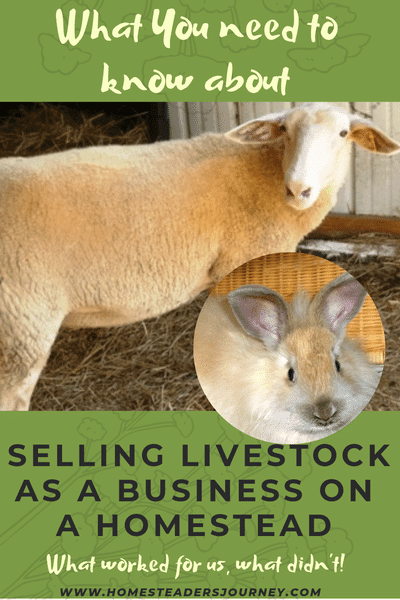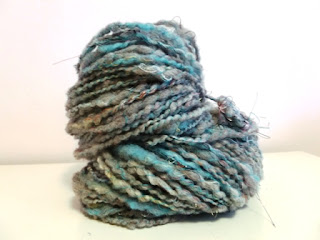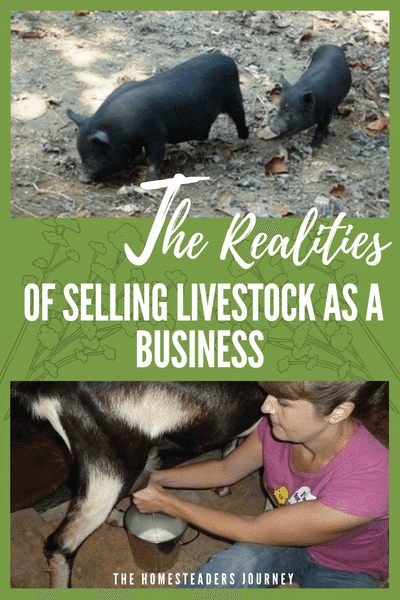Things to Consider if Selling Livestock needs to make money for your farm.
Having meat/milk animals means you will have to breed them and you will have some to sell, in hopes to cover the cost of raising and/or milking them.
Even with fiber animals many times you will need to breed them to make extra money to cover their feed since making enough money off raw fiber sales is next to impossible with feed and hay being so expensive some years.
If you have animals that live on pasture alone...and you have pasture all year... well... you are lucky but you probably still have to vaccinate, worm them have medicines (or herbs) and may have vet bills if they get sick. If you have sheep or alpacas you will have to buy an expensive shearing tool or hire a shearer and pray its a good one that takes bio-security pre-cautions with their shears and blades.
There are so many hidden costs in livestock! Multipurpose animals and breeding are just necessary for it all to work most of the time.
Example: I like Alpaca fiber and I had Alpacas for a very short time and this is one of the reasons I sold them. I figured it cost me around $105 a year to keep a non-breeding fiber male gelding Alpaca with mid-grade wool (of which these days the market is saturated) not to mention the management of the animal and my time. He will give me about 4 lbs of prime wool and maybe 2 lbs of seconds... I can buy good mid-grade wool for around $8 lb and a huge bag of seconds for $5. So $37... easy-peasy I got my alpaca fiber with no work or time spent keeping an animal healthy and fed. Then I've got more $ to spent else where!
So just keeping Alpacas for fiber doesn't add up for me. To make Alpacas work I would need to breed to help cover the cost to just break even. I would need Registered stock in order to get the highest prices possible for babies and help ensure they would be better homes.
Honestly, I would need to invest up front in not only registered stock but registered stock with lower micron counts and higher quality fiber than mid-grade! So then I could get more per pound for their fiber.
Because there is no meat outlet for the extra boys, the year a male is born probably means I might now make money or break even. I might even lose money breeding that year if say my fiber was ruined for some reason or another (like it felted or was extra dirty!)
But I might break even or even make some money if I turned that higher quality fiber into yarn or roving. Its ALOT to take on as part of a small homestead business.
However, keeping Alpacas was not for me for many reasons other than money but I do know fiber farmers who make it work with this model. It's not an easy road since alpacas are flooding the market. It brings down prices all over when that happens.
Handspun art yarns can be a very profitable side hustle for a creative individual on the homestead. But the rest of the numbers need to add up too!
Trending Livestock
What livestock is hot and trendy (yes, livestock has trends!) today may be worth half tomorrow, or even bottom out to the point people are just turning them loose or giving them away (example: Miniature horses, Nigerian dwarf goats, 'pet' pigs with no purpose, llamas, certain breeds of sheep,..yep alpacas!)This happens especially when an animal is bred and has no 'meat' purpose. Too many animals bred, too many geldings with no homes because they can't all be studs and no one needs a bunch of studs!
If the male has no purpose or his purpose isn't valuable, a huge problem of a saturated market happens and hurts everyone. Including the animals! When there is no outlet for those that don't make the cut as a breeder overstocking leads to bottomed out livestock markets.
Then you also don't have meat outlets for money. So when a male is born you're in the hole cost wise many times!
Now true, you could process extra animals with no market for your own meat! I know people who have done this. But thats a whole other set of skills and equipment I personally never wanted to get into. Processing poultry, waterfowl, and rabbits ourselves was enough for me!
Might be a solution for you if you if you've got the equipment/know how.
Trending livestock can be great for a homestead but only if breeding is done with a purpose and the extra males have a market. Cause no, they all don't make wonderful pets for people!
Getting in on the front end of the trend with a multipurpose livestock animal can mean excellent income for many years! For example the recently imported embryos of the Valais Blacknose Sheep
They will not only bring top dollar for lambs for many many years but their semen from purebred rams will be top dollar and their wool will bring top dollar! Its an investment, but if you're into niche wool sheep its an investment that will pay off for years!!
Especially if a meat demand is established so no one has to be overrun with extra males or poor producing females! Much like the Icelandic sheep breeders did, which is a sheep that has been here for years. A fantastic multipurpose sheep with niche wool for handspinners, a lamb meat market in demand and an excellent choice for sheep milk (trust me it's amazing!)! Read about one homestead dream come true here with this amazing sheep Icelandic Sheep for Profit.
Despite being here for many years the registered Icelandic sheep still brings way more than an unregistered cross. I've had both, and yes when I decided I needed to let the sheep go to pursue other goals I actually made money on the registered stock I resold. Plus I made money from the wool and had plenty of meat.
Maximizing with multiple outlets and purebred livestock
So anyways...my point is, youMost do not start their homestead dream with the idea of continuing to go to work to pay a feed bill for animals that do not pay for themselves. If this is your idea of homesteading than its a hobby, not a business. Nothing wrong with that!! My miniature horses are not a business, they make us no money. They are for my enjoyment, farm work, personal milking and that's fine with me!
But if you buy an animal and it must pay for itself or even profit in order for your dream homestead to work you have to consider where the money is going to come from first! What is the market for these products or animals you want in your area? Is there a market that can be tapped into over the internet? Be observant! Very Observant!
Selling Products from your livestock
If you want to sell meat, to who? Where are the customers? Don't say farmers markets.. they are becoming more and more like local craft fairs in many cities. Many successful meat farmers I know have to have several outlets for their meat to really profit. Check regulations for you state thoroughly. Do any small local based health and grocery stores carry local products? That may be a better bet and will be less time than spending the day at a market. Again be observant about outlets for the products from your livestock. Don't just assume your going to have a meat business or milk CSA. Do others in your area? Is there an outlet? A demand?Ofcourse if you have dairy animals or lard hogs soap is a great small farm business to consider that can be marketed to alot of people! Check out my No Fail Goat Milk Soap Recipe to get started! I've made really nice profits from my soap 'side hustle' over the years.
Selling Breeding Stock to other farmers
Where will you sell the breeding quality livestock you will have available? Is the market already saturated, is there a demand? Going prices?If you have invested in a rare livestock breed you may not have a local market at all.
Thankfully the internet can help there. But how does anyone know you're there with things to sell?
Don't say Facebook.. getting in groups and advertising livestock to people who already have livestock , who are trying to sell you livestock is not the best option! Trust ME!
So then you will need an internet business plan. Time consuming , yes, necessary for success, absolutely! Building a website isn't that hard these days either.
Invest In the Best
Always buy purebred and registered (if a registry is available some rare breeds don't have a registry yet) Even If your goal is to just break even never buy crosses.If you just want an animal that doesn't have to pay for itself then buy crosses all day. But if you want them to pay for themselves and especially if you need to profit, buy pure.. buy registered. I can not stress that enough.
I know I know... and I do understand! You may not want to spend the extra money on an animal that doesn't work out. I went down that road too unfortunately.
But, Here's the thing about that... if you buy purebred and if it doesn't work out you are more likely to get your money back out of it.
Purebred and registered (if a registry is available) will always bring more and be in more demand than crossed and unregistered.
There has been more than one occasion where I've invested in pure breeds and then decided it isn't working out and I've sold them for more than I paid! Because the other thing is purebred rare livestock and registered animals have a much much wider market. People will travel across states for them! No one is traveling from TX to TN for a cross piglet,, but they will for a purebred registered one.. trust me on this too because I do speak from personally experience many times over on this subject.
There were also plenty of times I bought crosses or so-called pure but unregistered and lost my butt when I tried to sell them. Or worse ended up having to process them because we couldn't sell them even for less! hard lessons learned...and much money was lost.
A good place to start learning about rare, purebred animals is the Livestock Conservancy
Case Study: French Angora Rabbit above here. Known as a dual purpose rabbit. They are not super rare but by buying high fiber quality bloodlines and pedigreed stock I was able to have a very healthy cash flow with them. They didn't work out for other reasons, my time was too committed to other things but when I sold my herd I made money on their resale too. You can read about why they didn't work for me but they may work for you here Raising Rabbits for meat and Fiber
Case Study: The Meishan pig breed has only been available to the American public for a short time. Its an incredible hog for a small farmer! Its registry is working hard to build a demand for its unique red meat which makes a superior charcuterie and an elegant meal. You can read more about that at the American Meishan Breeders Association
 |
| Meishan Meat, Not your typical dry white pork! |
Now Brainstorm!
Now that you have some things to consider get out a notepad and make notes!
Keep notes on potential livestock that can help your homestead dream come true and notes on the what , where and how much points of your available markets and outlets.
Y'all have an awesome weekend!
Blessings....





